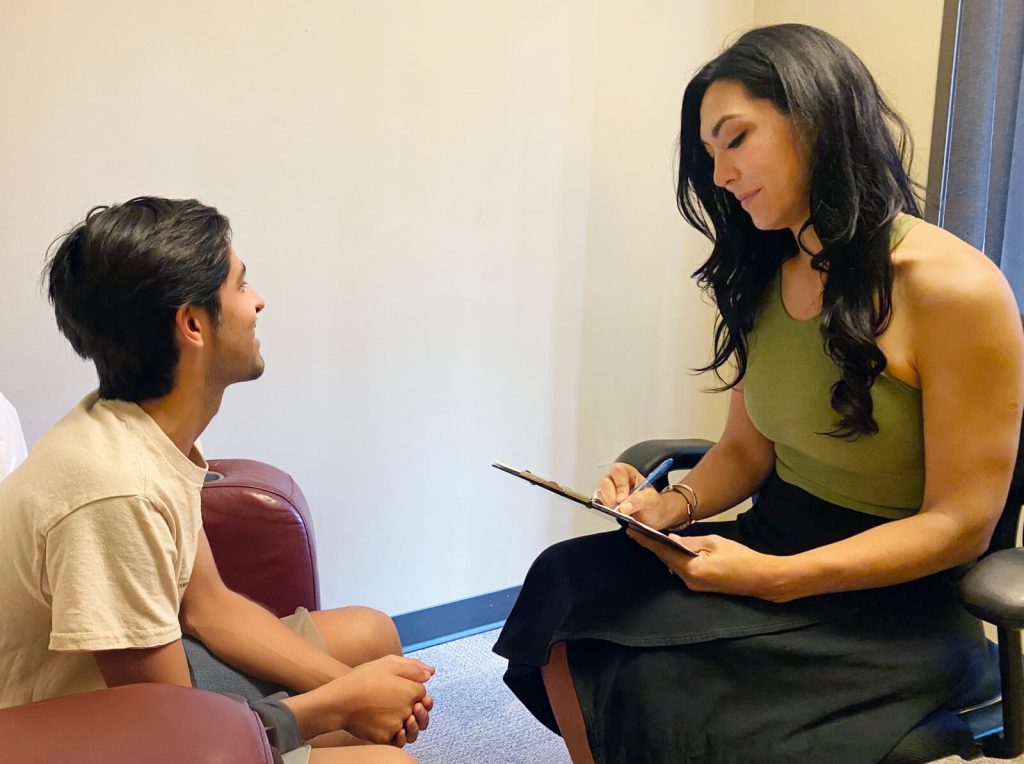The Ketamine-Assisted Somatic Mindfulness (KASM) Program offers a unique approach to healing that combines the transformative effects of ketamine with the grounding practice of somatic mindfulness. Developed specifically for our clinic by Dr. Kristian Flores, MD, ND, and Ivonne Flores, a skilled Somatic Mindfulness Facilitator, the KASM Program invites patients into a supportive environment to explore a new path toward relief and self-discovery. Through careful facilitation and a structured treatment plan, KASM empowers patients to unlock their own healing potential, addressing complex conditions like chronic pain, PTSD, and post-acute COVID syndrome.
The KASM Program
Jump to Section:
What is Ketamine-Assisted Somatic Mindfulness?
What conditions may benefit from KASM Therapy?
What is Ketamine?
Ketamine is a relatively safe medication that has been used clinically for over 50 years, namely as an anesthetic. Recent advances in the use of Ketamine have been remarkable including its use to treat various conditions that are typically refractory to many conventional treatments, including conditions such as Complex Regional Pain Syndrome, Post-Traumatic Stress Disorders and even Post-Acute COVID Syndrome (“Long-COVID”).
Ketamine acts primarily as an N-methyl-D-aspartate (NMDA) receptor blocker. Typically, the NMDA receptor acts to release the excitatory neurotransmitter glutamate, which stimulates neuronal activity. Ketamine blocks this receptor thus decreasing excitatory neuronal activity, most notably in the Prefrontal Cortex and the Hippocampus.
It is thought that the direct decrease in neuronal activity that occurs from Ketamine use is relatively short lived, lasting a few hours at most. Of course, the mechanisms by which ketamine affects the neuronal pathways that govern cognition, chronic pain, mood, and other autonomic nervous system processes are multi-faceted and complex (including effects on GABA-A, GABA-B, and mTOR among others).
What occurs because of this blockade varies significantly based on where in the brain the blockade occurs. In certain areas of the brain the blockade is followed by a surge in the excitatory neurotransmitter, glutamate. This surge is thought to be responsible for an increase in factors that promote the growth of synapses, thus reversing damage that can occur due to chronic stress and depression.
This surge of glutamate induces a surge in serotonin and noradrenaline. Significant decreases in serotonin are thought to be associated with the persistent neuro-cognitive symptoms in Long COVID (brain fog, fatigue, depression, attention deficit, etc.).
In the Hippocampus, the NMDA block results in decreased activity in channels that are used to access traumatic memories and recall feelings of stress. This is thought to be the main mechanism by which ketamine aids with PTSD symptoms.
Still, in other areas of the brain the blockade can result in a “reset” phenomenon of the central nervous system. The therapeutic effects in this instance are most associated with a blockade of central mechanisms of sensitization that can be found in pain patterns such as complex regional pain syndrome.
What is Somatic Mindfulness?
Somatic Mindfulness is the practice of focusing attention on the present experience while listening to what your body is trying to convey.
While the practice involves focusing on sensations within your body, the emphasis is trying to maintain a present focus without allowing the physiological sensations of an overly stimulated nervous system to be the center of your attention. The focus is to create a grounded space to observe and connect with what your body is trying to tell you. The invitation of this practice is to allow the body to be heard.
What is Ketamine-Assisted Somatic Mindfulness?
The Ketamine journey itself is powerful but works best when used as part of a comprehensive treatment plan. For this reason, we created the Ketamine Assisted Somatic Mindfulness (KASM) Treatment Program.
The goal in pairing Ketamine treatment with Somatic Mindfulness is to allow our patients to derive the greatest benefit from the experience by approaching the treatment with intention while our facilitators hold a supportive space.
As a dissociative, Ketamine has the potential to create a non-ordinary state of consciousness, facilitating a profound experience that may be different from one’s ordinary reality and usual sense of self. These sorts of peak experiences have been shown to expand one’s perspective and understanding of existence and may enable you to access your own healing wisdom. Your providers serve as a facilitating guide and assist in processing the experience and its impact on your everyday life. The goal is to allow our patients to safely explore the Ketamine experience with gentle guidance, allowing the patient to make these learned experiences part of who they are, rather than something they did.
The power of this experience is not limited to the small amount of time in which you are under the influence of the medicine. This is a process that naturally unfolds over the subsequent days and weeks after the treatment, and it is often later reflection that provides key perspectives on your work.

One week prior to receiving your ketamine IV, you’ll participate in a Clinic or Telehealth office visit with Somatic Mindfulness Facilitator Ivonne Flores.
What conditions may benefit from KASM Therapy?
- Chronic Pain and Fatigue Syndromes (CPS/CFS/Fibromyalgia)
- Complex Regional Pain Syndrome (CRPS)
- Post-Traumatic Stress Disorders (PTSD)
- Post-Acute COVID Syndrome (“Long-COVID”)
The KASM Treatment Program
Initial Session (60 minutes):
Clinic office visit with Kristian Flores MD, ND and Somatic Mindfulness Facilitator, Ivonne Flores. During this session you can expect to discuss the following:
- Medical eligibility, assessment, and screening
- KASM session orientation
- Understanding the role of KASM facilitation and holding therapeutic presence
- Exploring expectations, concerns, fears and responses
- Building a relationship of trust and establishing rapport
- Meet our entire treatment team
- Informed Consent: honor pledge, ethical considerations, choice and agency, safety protocols, agreements and boundaries
KASM Preparation Session (45 minutes):
Clinic or Telehealth office visit 1 week prior to treatment with Somatic Mindfulness Facilitator Ivonne Flores. During this session you can expect to discuss the following:
- Somatic Intention Setting
- Exploring the “why” of intention setting
- Guiding to finding the intention
- Mapping the Narrative
- Exploring current practices (Breathwork, Meditation, etc.)
- Exploring current support systems (Community, Relationships)
- Creating integration resources
- Procedures and Operations
- Ketamine orientation
- Session preparation instructions
KASM Treatment Session (120 minutes):
Clinic treatment visit with Dr. Flores, Somatic Mindfulness Facilitator Ivonne Flores, and Dixie Johnson, Medical Assistant. During this session you can expect the following:
- Pre-Treatment (15 min)
- Recall the intention with guided visualization or grounding exercise
- Intravenous Ketamine Session (45-60 minutes)
- Post-Treatment (45 min)
- Continue to monitor medical stability
- Integration session
- Recalling integration resources
KASM Integration Session (45 minutes):
Clinic or Telehealth office visit 1 week after treatment with Somatic Mindfulness Facilitator Ivonne Flores. During this session you can expect to discuss the following:
- Exploring the Ketamine experience: insight/highlights
- Exploring emerging themes after Ketamine
- Somatic integration: what is showing up in the body?
Additional KASM Sessions (45 minutes):
Every additional KASM session includes a preparation session with somatic intention setting (30 minutes) as well as an integration session post KASM session (30 minutes)


